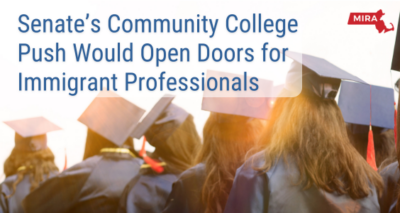
The Senate continued its strong commitment to broad educational access in the FY25 budget it passed last Friday, investing $117 million to support attendance at community colleges for Massachusetts students, including $75.5 million for a proposed free community college program and $10 million for books and supplies for low to moderate income students, as well as continued free tuition for nursing programs, MassReconnect, and expanded state financial aid.
If adopted in the final budget, the free community college initiative will cover costs of tuition and fees at community colleges for all students who have lived in Massachusetts for at least one year and have not previously earned a college degree at a U.S. institution.
The Senate also adopted a MIRA priority amendment sponsored by longtime ally Senator Jason Lewis of Winchester, directing $190,000 in public funding to Bunker Hill Community College’s Welcome Back Center for Internationally-Educated Nurses for the second year in a row. This investment allows the Center to continue building programmatic and financial support for nurses to return to their professions here.
Kristina Sokolovska Konieczny has firsthand experience with the Center. Kristina is an experienced, internationally-trained physician from Macedonia who pursued a nursing career at Bunker Hill Community College after trying unsuccessfully to overcome the high barriers to physician licensure here for those who trained and practiced abroad. After completing all prerequisites, she applied to over 200 residency programs in the United States but was unable to compete with recent medical school graduates for the limited slots available. Worried that her dreams of working in healthcare here would come to an end, she searched for an alternative route.
Kristina’s search led her to the Welcome Back Center, which helps internationally-educated nurses obtain the professional credentials and licenses needed to work in the United States. Kristina qualified for the program since she had previously completed studies in nursing in her home country. Reflecting on her experience at the Center. Kristina said, “the staff were wonderful, I can’t say enough praise and gratitude for all they do and how wonderful they are.” The staff offered guidance “every step of the way”, she added. Kristina also had the support of more than 10 program participants from all over the world, including nurses from the Philippines, Haiti and China.
Now a nurse in Massachusetts, Kristina has directly experienced the impact of the healthcare workforce shortage. ”Due to the shortage of nurses it is imperative to have Welcome Back Centers,” she said. ”Welcome Back Centers should be made known to the public and should be advertised to greater populations, should be more readily available in more locations, and should extend branches in Western and Central Massachusetts areas that are underserved with limited access to health care doctors and nurses.”
The advice Kristina has for immigrants pursuing education in Massachusetts is “keep going, find ways, keep your eyes on the future, keep going forward.” She admits, “it is tough when you are an immigrant and you don’t know where to go or what path to take – I didn’t know where to go – but do not give up, there is always a way.”
Kristina’s story highlights the importance of community colleges, which play an integral role in our state economy. They create pathways for students to obtain professional certification and training, keep up to date with industry trends, build supportive networks, and learn and improve language abilities; and help displaced workers return to the workforce.
